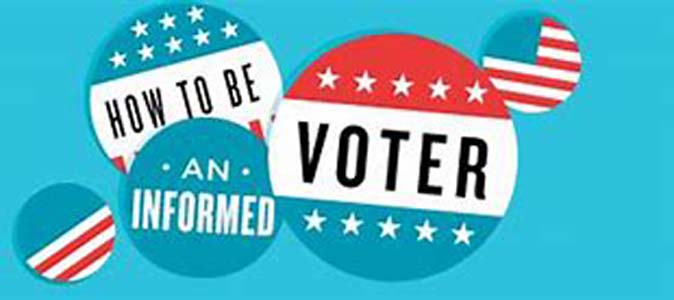VOTE! In the run-up to the election, that message is everywhere from billboards to social media. Sometimes it seems like a routine exhortation. Other times it feels like voting has been weaponized, a way to reward people we like and punish our adversaries.
Make no mistake. The exhortation to VOTE! is important. Only about half of eligible citizens exercise their franchise in any election, and that’s definitely a danger to democracy. That said, we would like to recommend a course of action that is more cooperative and, in all likelihood, wiser:
First, become informed. Then, vote.
It’s harder than it sounds. Many of the issues voters will be asked to decide are complex. We may be inclined to support one cause, but often that course of action has implications that haven’t been fully considered. And candidates are complex too, living human beings who are the product of many influences. We may like the stand someone takes on one issue only to be dismayed by their opinions on other matters. Also, both issues and candidates have been warped by a hyper-partisan atmosphere that reduces everything to sound bites and slogans.
So what’s a responsible citizen to do? Here are some practical suggestions:
Whenever possible, ignore branding.
Don’t think about whether a person or a proposition is labeled Democrat or Republican, liberal or conservative. Instead, look at the ideas. Do they make sense to you? Are they grounded in reliable information? Do policies seem fair and workable? Try to anticipate the consequences of policies. Who will be affected? How? And at what cost?
Find neutral sources for information.
Human beings have biases that grow naturally from their own experiences. Some people and organizations make a principled effort to rise above individual bias in order to pin down facts and provide crucial information. Make use of them whenever possible. Here are some sources that have proved reliable in the past: Votesmart.org; Ballotpedia.org; and PolitiFact.org, and the League of Women Voters. (If you know of others, please share.)
Monitor your own responses.
If you find yourself becoming angry and hostile, step back. Think about why you are reacting that way. What is at risk for you? Why are your feelings so intense? If there are equally angry people on the other side, consider–or ask–what is at risk for them.
Make a good faith effort to understand the other side.
This can be very difficult, especially for highly partisan issues. Still, when people dig in, they are defending something that matters to them. What vulnerabilities do they see that may not be obvious from your point of view? What arguments do they make? What data do they cite? What track record do they have for their ideas? Understanding multiple points of view makes it more likely that solutions to problems will be durable.
Avoid election materials that trigger strong emotion.
It’s hard to think clearly when you are enraged. Instead, consider the source. Who produced that message? Do they want you to react instead of thinking? If so, what’s their motivation?
Share materials that encourage thinking about important issues.
This is not a time for mean jokes or snarky memes on social media. They let off steam without getting anyone closer to a solution. When you find something that actually illuminates a topic or sheds light on an alternative point of view, share that.
Don’t allow yourself—or your fellow citizens—to be reduced to stereotypes or, worse, caricatures.
You are more than a party affiliation or an interest group. You are a citizen of a great nation. As a voter, you are responsible for considering the issues and making the best decision you can not only for yourself but also on behalf of your fellow citizens.
All of these suggestions are rooted in the five social virtues that make up Cooperative Wisdom. The more we can put them into practice before an election, the more likely we are to make sound decisions in the voting booth. And if more of us cultivate the same habit of thoughtful inquiry after the election, we are more likely to break the constraints of partisanship, finding durable solutions to our problems that create widespread benefits by respecting diverse values.
Cooperative Wisdom is available from Amazon, Barnes & Noble and Kobo.


Leave a Reply